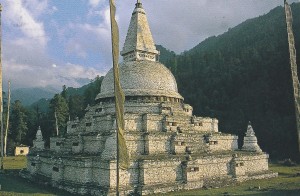I learned about stupas from my dear friend Geneve, who made several treks to India to visit her guru. She returned with postcards of stupas visited there, and I became enamored of them. I’m no expert, but here’s what I learned. A Buddhist tradition, stupas originated as earthen burial mounds, places of meditation and visitation for the living to honor the dead, then developed into more complex and elaborate constructions, some representing the shape of the Buddha sitting in meditation, with stupa details reflecting the 5 elements of purification.
Stupas may also be relatively rustic constructions of whitewashed stones decorated with prayer flags and Buddha eyes. Others were labors of great devotion and massive work efforts. The tallest, largest, and one of the oldest stupas is in Sri Lanka, and it took 15 years and over 9 million baked earthen bricks to build. Other notable stupas may be seen and visited in Thailand, Pakistan, Mumbai, Java, and India, among other places.
Stupas often contain relics enshrined within: special possessions, scriptures, and remains of Buddhist monks, commemorative or symbolic objects, and tsa tsas, or written mantras. All stupas encase a central tree-of-life pole. Erecting a stupa supposedly brings great immediate and karmic benefits to the builders. With this in mind, a friend and I decided to build a small rock stupa together one desert Spring.
This exercise included gathering all the rocks needed to build the stupa, a meditation in itself. Before placing any rocks, we decided to write poems about the experience, so we had something to enshrine within the stupa. Both poems took the same title: The Precarious Possibility of Wholeness, and we created a time limit in which to write our unique versions. After reading aloud our poems, we rolled and stuffed them into tiny glass jars to withstand the elements and time deep within the stupa.
Then began the process of stacking rocks into a stout-based tower and interlocking form that would remain in place for years of visits and meditations. If you’ve ever worked with rock, you know this process is like piecing together a big, heavy puzzle. If a rock doesn’t fit in one place, it must be moved to where it does, not forced, no exceptions, just like jigsaw pieces. From the bottom layer up, every placement counts. If the foundation rocks aren’t solidly set, none that follow will be either. After a full day of creative work, we completed the stupa.
It stood for many years on a path I walked every morning, reminding me of my friend who helped build it, and the opportunities we have daily to offer up prayer, meditation, and gratitude for this life. Desert birds enjoyed alighting on its apex, to survey the area and make loud pronouncements about the world. Then one day while I was working in my gardens, I heard a great waterfall sound of rocks returning to earth–it was like a song!–surrendering to forces of nature and time.
I dug through the chaotic rock pile to retrieve the jars for safe keeping. Then in a move suggestive of karmic rebirth into new form, I used the rocks to edge and secure the fence bottom of one of my gardens that a visiting group of javelina kept rooting under, to eat my juicy greens. They haven’t gotten in since.
Is succumbing to gravity and collapse bad karma? Not likely. Things constantly shift and change, even the great monuments of human ingenuity and folly. Nothing lasts–except stories, memories, prayers, and poems that live inside us, like relics stowed in a beautiful, humble stupa.
Precarious Possibility
Little stupa stone simple
Drop me to my knees to worship
The solidity of rock and earth
The dependability of gravity and falling
The vulnerability of balance and wholeness and
The sweet addiction of creativity and purpose.
Mark my path
And this rare territory
With this unlikely pile of
The pretty the dull the heavy the hidden
The crystallized the load-bearers
The best-for-last the story-starters.
Yes I’ll marry you mass and space
If you promise to love
Where you are and
The inevitability of change.
Take as your lovers the elements
Rain washing waterfalls down on you
Wind whistling major and minor tunes through
Sunlight penetrating deeply to your core
Cold exploding molecules cracking you wide open
Moonlight tolerating the interruption of your shadow.
Oh shrine to remembrance
Oh habitat for the tiny
Oh wonder at the hand
Lifting and placing
The heart’s investment in
The precarious possibility of
Wholeness.


